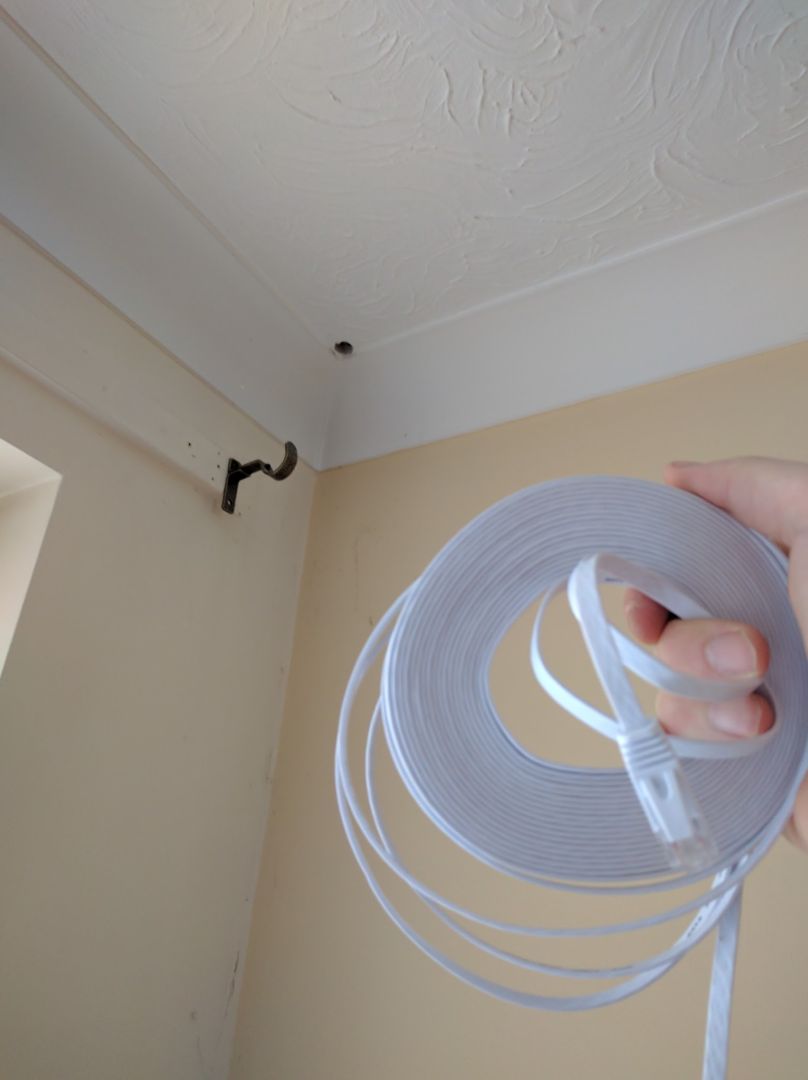If you are lucky enough in life, you get to suffer from the 1st world problems like mine. How to get better local network speeds? While the utility bills are not on the list of my daily worries, I’m not a Rockefeller by any means and I consider costs like any other sensible person.
The world is going WIFI crazy, and I also have A/C WIFI access point kindly provided, with a hell of a bill to pay, by Virgin Media. That’s OK most of the time, and perhaps I’m the only person to complain about the internet in the household of three. This super machine has an average range, needs rebooting three times a week, and each time I get it restarted it takes like four minutes to get the radios up!
On the positive side, it does cover the house OK even upstairs, offering 2 bands and maxing out my 50Mbps connection. The frustration was caused mainly by a severely underpowered laptop that was not able to send the signal to the router, unless the laptop has been, in the same as the AP, room. To cut the story short, I ordered Intel 7260 AC WIFI card to solve this for good.
Why Wires?
If the problem is no longer there, why bother? If you ever transferred a file over a 1Gbps network you would know the ‘WOW’ factor you get while doing so. I suffered before from transfer issues when I was trying to stream content to the Playstation 4 from my PC, and nothing kills the Friday’s night date as a movie stopped for no apparent reason.

From 
To
While my WIFI upgrade is on the ‘Eternal wishlist of things to buy when I get rich’ (or when manufacturers will send me review samples) I figured, I will take a closer look at Ethernet options.
A guide to Ethernet on the cheap
I spend less than £20 (about $20) for everything I needed to connect 5 devices across 4 rooms and 2 floors together. If you wish to do it on the cheap – you must have some patience. Here is the shopping list
- Ethernet Cat6 flat cables (Aliexpress) – $17
- Unmanaged Netgear 5 port Gigabit switch (Amazon) $5
And… That is all.
While you can get away with Cat5e and pay a little bit less, there is no reason for doing so. Savings are not significant, especially if you allow the Aliexpress to deliver the cables to you from China. I have paid about $17 for 8 cables (1x10m, 2x8m, 3x3m, 2x2m) which are a bargain. Going for Cat6 cables, I future-proofed the entire design as well.
I also picked a popular and well-reviewed switch to get a few extra ports upstairs. These are plug-in and forget boxes so keep it reputable to avoid any issues. Apparently, I’m valued in one way or another, as Amazon has taken $5 off my purchase for no apparent reason! But you can get these for about $10.
Even if your current devices don’t support 1Gbps Ethernet, there is no real reason to pick the slower speed links. It is not something you will be upgrading every year, and 1Gbps becomes a standard unless your wife picks this as a daily driver:

Getting dirty
Taking down the walls is not something I have been prepared for. Drilling a hole in the ceiling was not something I have ever attempted either. I’m glad to report that walls are in one piece and roof is still placed above it. The whole operation took me about 3h (including clean up and plastering the holes) I ended up using a 19mm bit for all the holes. It was much bigger than needed but made it easier to route the cables.
Through the roof
Thanks to my neighbour – I got a proper drill and bits for that. Chances are you will be up against a plasterboard and some wooden boards. If you are unlucky – you will need a masonry bit and a lot of patience. Aim for the corner if possible. It’s the easiest way to hide a cable in a plain sight. If possible, don’t drill in the exact corner. You are more likely to hit a beam. It’s very unlikely you will hit any wires or pipes. It took me about 5 sec to drill through it. Do it from the bottom floor.
Through the wall
You will be drilling through 2 plaster boards unless this is a support wall. Aim near the skirting board, if you can remove one – it’s even better. If the wall contains power sockets, drill below the level of the socket, if your wires are done well, it will never go diagonally. Do take care. This took me about 30 seconds. Mostly because I used a flashlight to check for wires once I pierced the plasterboard.
Under the carpet
If you have a hard floor you have to get creative, otherwise flat cables can be laid down anywhere under the carpet without changing the shape of the floor. Keep the cable tidy, run it against the edge of the room. don’t let it tangle. If you don’t have the carpets, you can stuff the cable underneath the skirting board or glue it flat along it. Take your time, use silicone in case you want to remove it easily.
Keep it custom
I hid my switch in the wardrobe. To do so I needed a longer power wire. I simply spliced the cable, made an extension and run the wire underneath the carpet. This way, no one can tell there was anything done in the first place. This is why you should think and plan ahead. Always order cables 1m longer than needed unless you are absolutely sure that you need a specific length. The goal is to leave an as little trace as possible.
The Cleanup
You don’t have to be a master plasterer to patch a hole. While a hole in the floor is hard to fix if you have a hard floor, it is nothing to be worried about if you have carpets and insulating foams. In DIY shops you will find some ready solutions to fix small holes, and all you need is a butter knife if you don’t want to spend extra for the proper tools.
I found a silicone (the bathroom type) to be a great glue. Easy to peel off if needed, and sticky enough to hold a cable. If you are worried about putting too much of it, use a paper tape to mask off the area. Cables (unless you have really colourful cables or walls) are nearly invisible in corners or near the skirting boards.
There are no other pictures to show, mostly because a good job is when you can’t tell that anything has been done in the first place. And apart from the cable on the picture, everything else is hidden. I’m happy with everything right now. And with last parts arriving for the NAS-pi build project, I will be updating you soon on how the Raspberry Pi NAS drive works in that environment as well.
Feel free to follow me on social media as it helps me grow, share it, and comment if you need any advice. You can also support me, and fund my projects directly.
































